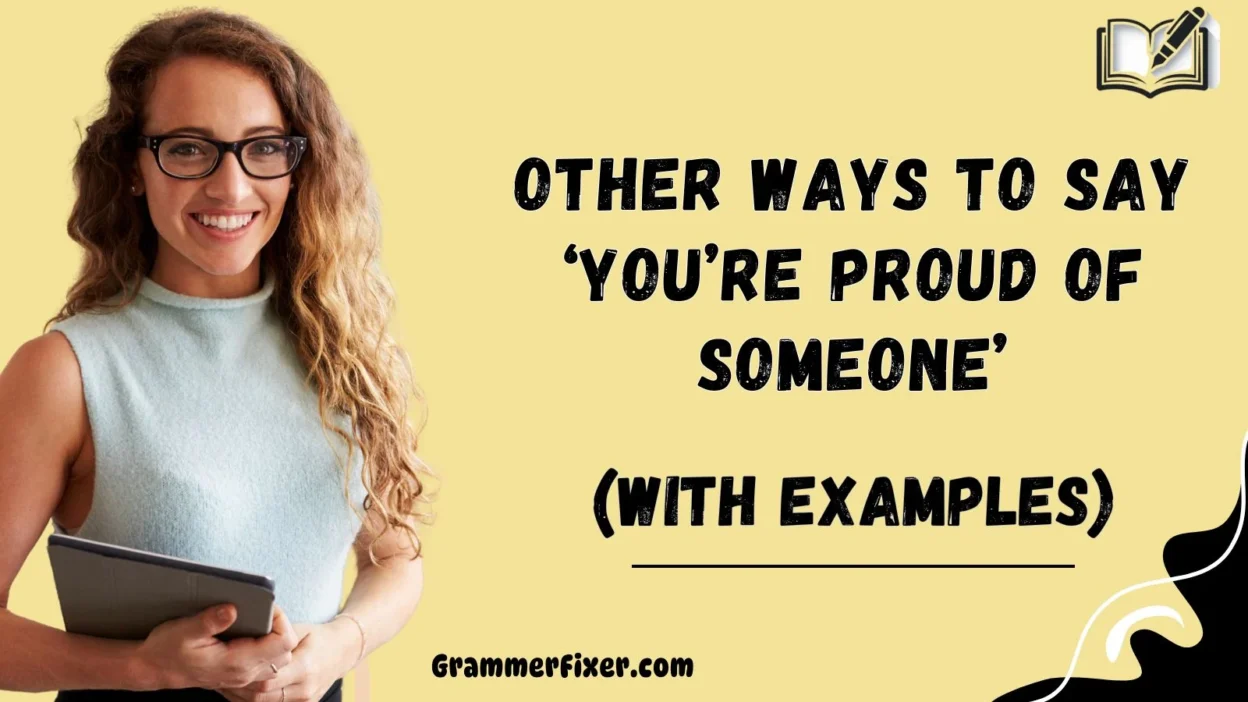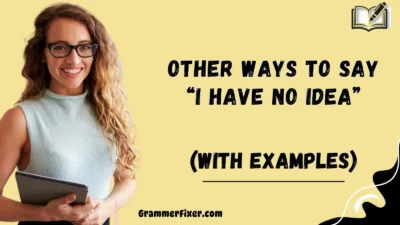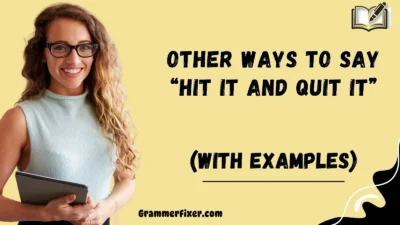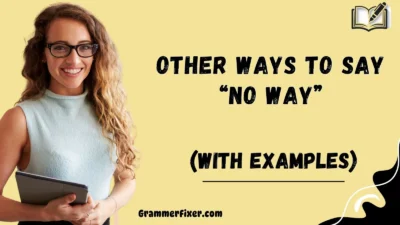Finding the right words to express pride in someone can make a huge difference. Whether you’re recognizing a friend’s accomplishments, a colleague’s hard work, or a loved one’s growth, using thoughtful and heartfelt phrases helps create a meaningful connection. Instead of relying on the same old “I’m proud of you,” these alternatives let you show warmth, care, admiration, and authenticity in ways that feel personal and impactful.
Below, you’ll find 30 creative alternatives—each with its meaning, explanation, scenario examples, best use, worst use, and tone—to help you express admiration and acknowledge achievements with sincerity.
What Does “You’re Proud of Someone” Mean?
Saying “I’m proud of you” is an expression of admiration and recognition. It communicates that someone’s efforts, growth, or accomplishments are valued and respected. At its core, it’s a way of saying: “I see the dedication you’ve put in, and it matters.”
When to Use “You’re Proud of Someone”?
Use this phrase when you want to:
- Celebrate big milestones like graduations, promotions, or awards.
- Acknowledge everyday efforts such as consistency, perseverance, or improvement.
- Encourage someone who might feel uncertain about their progress.
- Recognize personal growth beyond achievements, like kindness, maturity, or resilience.
Is It Professional/Polite to Say “You’re Proud of Someone”?
Yes—but context matters. In personal relationships, it shows love, support, and warmth. In professional environments, it’s usually better to say:
- “I admire your dedication.”
- “You did an outstanding job.”
- “Your hard work really shows.”
This keeps the tone respectful and encouraging without sounding patronizing.
Pros or Cons of Saying “You’re Proud of Someone”
Pros:
- Conveys genuine appreciation.
- Builds confidence, trust, and motivation.
- Strengthens relationships.
- Encourages continued growth and effort.
Cons:
- Can feel overused or generic.
- May sound patronizing in professional settings.
- Risks being seen as insincere if not specific.
- Could unintentionally create pressure to perform.
1. You’ve Outdone Yourself
Meaning: Recognition that someone has exceeded expectations.
Explanation: Highlights effort and results that go beyond the usual standard.
Scenario Example: “You’ve really outdone yourself with this presentation—it was organized beautifully and exceeded expectations.”
Best Use: When someone has excelled on a big task or project.
Worst Use: For small everyday efforts—it might feel exaggerated.
Tone: Complimentary, professional, and celebratory.
2. I’m Amazed by You
Meaning: Expresses awe at someone’s abilities or results.
Explanation: Focuses on being genuinely impressed by their actions or achievements.
Scenario Example: “I’m amazed by how effortlessly you handled such a complex situation.”
Best Use: To show deep admiration in both personal and professional contexts.
Worst Use: When addressing routine tasks.
Tone: Heartfelt, warm, and encouraging.
3. You Make Me So Happy
Meaning: Communicates that someone’s success or growth brings joy.
Explanation: Centers the emotional impact of their accomplishment.
Scenario Example: “Seeing you graduate makes me so happy—you’ve worked so hard for this.”
Best Use: Family and close relationships where emotion matters most.
Worst Use: In formal or workplace settings.
Tone: Loving, supportive, emotional.
4. You’ve Grown So Much
Meaning: Recognition of personal development and maturity.
Explanation: Focuses less on results and more on progress over time.
Scenario Example: “You’ve grown so much as a leader—I admire your patience and confidence.”
Best Use: When acknowledging long-term improvement.
Worst Use: As casual praise without context—it may sound condescending.
Tone: Affirming, reflective, supportive.
5. You’ve Set the Bar High
Meaning: Shows admiration for raising standards through achievements.
Explanation: Suggests that someone’s work has become a benchmark for excellence.
Scenario Example: “Your dedication has set the bar high for the whole team.”
Best Use: Professional environments or group settings.
Worst Use: In intimate or emotional conversations—may sound impersonal.
Tone: Professional, motivational, admiring.
6. You’ve Earned It
Meaning: Acknowledges that success is the result of hard work and dedication.
Explanation: Reinforces that the achievement is deserved.
Scenario Example: “You’ve earned every bit of recognition for this project.”
Best Use: When celebrating major achievements.
Worst Use: For small gestures—it might feel too grand.
Tone: Validating, affirming, respectful.
7. You Make Me Smile
Meaning: Expresses that someone’s efforts or growth bring personal joy.
Explanation: Connects accomplishment to emotional impact.
Scenario Example: “You make me smile every time I see how far you’ve come.”
Best Use: In close relationships or friendships.
Worst Use: In a corporate or formal context.
Tone: Warm, heartfelt, uplifting.
8. You Shined
Meaning: Highlights someone’s moment of excellence.
Explanation: Perfect for moments where a person’s talent was clearly visible.
Scenario Example: “You really shined during your speech—it was inspiring.”
Best Use: For performances, presentations, or public moments.
Worst Use: When the achievement wasn’t visible to others.
Tone: Celebratory, encouraging, appreciative.
9. You’ve Taken Things to the Next Level
Meaning: Recognizes improvement and progress beyond the ordinary.
Explanation: Suggests a new standard of excellence has been achieved.
Scenario Example: “You’ve taken your skills to the next level—your growth is inspiring.”
Best Use: To encourage continued personal or career development.
Worst Use: In casual, everyday conversations.
Tone: Professional, motivational, affirming.
10. That Was a Huge Win
Meaning: Celebrates a major success.
Explanation: Acknowledges a significant achievement that required effort and perseverance.
Scenario Example: “Landing that client was a huge win for the company—well done.”
Best Use: Business and professional accomplishments.
Worst Use: For minor achievements.
Tone: Energetic, celebratory, appreciative.
11. You’re an Absolute Star
Meaning: Recognizes someone as a standout performer.
Explanation: Compares their success to shining like a star—bright, visible, and inspiring.
Scenario Example: “You’ve been an absolute star on this project—your dedication shows in every detail.”
Best Use: When highlighting someone’s reliability and consistent effort.
Worst Use: Overusing it in professional contexts—it may sound too casual.
Tone: Cheerful, uplifting, encouraging.
12. You’ve Proven Yourself
Meaning: Highlights credibility and reliability earned through actions.
Explanation: Suggests they’ve demonstrated their skills, abilities, and perseverance.
Scenario Example: “You’ve proven yourself as a strong leader—your team really respects you.”
Best Use: Workplace, academic, or team settings.
Worst Use: In close relationships, it may sound transactional.
Tone: Validating, professional, affirming.
13. You’re Such an Inspiration
Meaning: Positions the person as a source of motivation.
Explanation: Suggests that their actions or achievements inspire others to aim higher.
Scenario Example: “Your resilience after setbacks is inspiring—you remind me what determination looks like.”
Best Use: When someone’s journey has a positive influence on others.
Worst Use: For everyday tasks—it can lose depth.
Tone: Admiring, motivational, heartfelt.
14. You’ve Nailed It
Meaning: Direct praise for successfully completing a task.
Explanation: Casual yet enthusiastic acknowledgment of getting something exactly right.
Scenario Example: “You nailed that client pitch—it was confident and persuasive.”
Best Use: For specific achievements or tasks.
Worst Use: In formal situations where casual tone isn’t suitable.
Tone: Energetic, informal, celebratory.
15. That Was Well-Deserved
Meaning: Affirms that recognition or success is earned fairly.
Explanation: Reinforces justice and merit in the accomplishment.
Scenario Example: “Your promotion was well-deserved—you’ve put in so much dedication.”
Best Use: In professional recognition.
Worst Use: For minor or routine matters—it may feel exaggerated.
Tone: Respectful, affirming, formal.
16. You’ve Raised the Standard
Meaning: Praises someone for elevating expectations.
Explanation: Implies their work sets a new benchmark of excellence.
Scenario Example: “Your design has raised the standard for future projects.”
Best Use: When someone’s achievement has lasting impact.
Worst Use: Casual, small-scale efforts.
Tone: Professional, appreciative, admiring.
17. You’ve Overcome So Much
Meaning: Celebrates resilience and perseverance.
Explanation: Recognizes the effort required to overcome challenges.
Scenario Example: “You’ve overcome so much to get here—you should be proud of yourself.”
Best Use: In personal, heartfelt encouragement.
Worst Use: When the situation wasn’t truly challenging.
Tone: Empathetic, emotional, supportive.
18. You’re Worthy of Every Bit of This
Meaning: Reinforces that success is fully deserved.
Explanation: Centers the person’s value and self-worth.
Scenario Example: “You’re worthy of every bit of recognition you’re receiving tonight.”
Best Use: For significant celebrations like awards, graduations, or promotions.
Worst Use: Everyday encouragement—it might sound overly formal.
Tone: Affirming, heartfelt, uplifting.
19. You’ve Made a Huge Impact
Meaning: Acknowledges the influence and contribution someone has had.
Explanation: Goes beyond personal success to highlight their effect on others.
Scenario Example: “You’ve made a huge impact on this community with your volunteering.”
Best Use: When recognizing long-term contributions.
Worst Use: For small, one-time tasks.
Tone: Respectful, affirming, appreciative.
20. I Can’t Wait to See What You Do Next
Meaning: Encourages continued growth and future achievements.
Explanation: Expresses excitement for their potential and journey ahead.
Scenario Example: “I can’t wait to see what you do next—you’re on an inspiring path.”
Best Use: To motivate someone who’s on a career, personal, or creative journey.
Worst Use: When their achievement was a one-time effort with no ongoing path.
Tone: Optimistic, motivational, future-focused.
21. You’ve Shown Incredible Strength
Meaning: Praises inner strength and resilience.
Explanation: Focuses on the character behind the achievement, not just the outcome.
Scenario Example: “You’ve shown incredible strength through tough times—it’s inspiring.”
Best Use: During emotional or challenging life moments.
Worst Use: For minor tasks or casual recognition.
Tone: Empathetic, heartfelt, powerful.
22. You’re Truly Amazing
Meaning: Simple yet powerful admiration for someone’s abilities or qualities.
Explanation: A versatile phrase that highlights remarkable achievements or character.
Scenario Example: “You’re truly amazing—I admire your determination and kindness.”
Best Use: Both personal and informal professional settings.
Worst Use: Overuse can make it feel generic.
Tone: Warm, supportive, versatile.
23. You’ve Come So Far
Meaning: Acknowledges growth and progress over time.
Explanation: Recognizes not just the achievement, but the journey leading to it.
Scenario Example: “You’ve come so far since last year—I admire your perseverance.”
Best Use: When someone has shown steady improvement.
Worst Use: Without context—it can feel vague.
Tone: Encouraging, reflective, affirming.
24. You Shine Through Everything You Do
Meaning: Expresses admiration for consistent excellence and positivity.
Explanation: Suggests their talent, character, or effort is evident in all they pursue.
Scenario Example: “You shine through everything you do—your hard work is inspiring.”
Best Use: Personal and professional praise with emphasis on consistency.
Worst Use: When their performance hasn’t been strong—it may seem insincere.
Tone: Heartfelt, uplifting, admiring.
25. That Was Incredible
Meaning: Enthusiastic recognition of an impressive achievement.
Explanation: Direct, energetic praise that communicates awe and excitement.
Scenario Example: “That was incredible—you exceeded everyone’s expectations.”
Best Use: After standout performances or big wins.
Worst Use: Everyday accomplishments.
Tone: Excited, enthusiastic, celebratory.
26. I Believe in You
Meaning: Reinforces trust in someone’s abilities and future success.
Explanation: Encourages confidence and shows unwavering support.
Scenario Example: “I believe in you—you’ve worked hard, and you’ll keep thriving.”
Best Use: In moments of doubt or challenge.
Worst Use: After a failure without context—it could feel empty.
Tone: Supportive, motivational, empowering.
27. You’ve Reached New Heights
Meaning: Acknowledges achieving higher levels of success.
Explanation: Suggests someone has pushed beyond previous limits.
Scenario Example: “You’ve reached new heights with your writing—this book is remarkable.”
Best Use: Recognizing career, creative, or academic achievements.
Worst Use: For minor tasks—it loses impact.
Tone: Motivational, celebratory, professional.
28. I’m So Glad to See You Thrive
Meaning: Celebrates someone’s growth and flourishing.
Explanation: Expresses joy in witnessing their success or well-being.
Scenario Example: “I’m so glad to see you thrive in your new role—you’ve earned this.”
Best Use: For personal encouragement and professional growth recognition.
Worst Use: If they’re currently struggling—it could sound dismissive.
Tone: Warm, supportive, joyful.
29. You Deserve All the Recognition
Meaning: Validates that their success is acknowledged and deserved.
Explanation: Removes any doubt about the fairness of their achievement.
Scenario Example: “You deserve all the recognition for how tirelessly you worked on this project.”
Best Use: Formal or celebratory contexts.
Worst Use: Repeated too often—it can feel like a script.
Tone: Respectful, affirming, celebratory.
30. You’re a Real Inspiration to Others
Meaning: Highlights the positive influence someone has on those around them.
Explanation: Goes beyond personal achievement—recognizes their impact on the community or peers.
Scenario Example: “You’re a real inspiration to others—your dedication motivates everyone.”
Best Use: When acknowledging leadership, mentorship, or public impact.
Worst Use: Everyday situations—it should be saved for truly inspiring achievements.
Tone: Admiring, motivational, powerful.
Conclusion
Saying “I’m proud of you” is powerful, but sometimes it can feel overused or too simple. By exploring these 30 thoughtful alternatives, you can add variety, depth, and sincerity to your words of encouragement. Each phrase carries its own tone, context, and emotional weight, allowing you to tailor your expression to the situation—whether you’re cheering on a friend, recognizing a colleague, or supporting a loved one.



